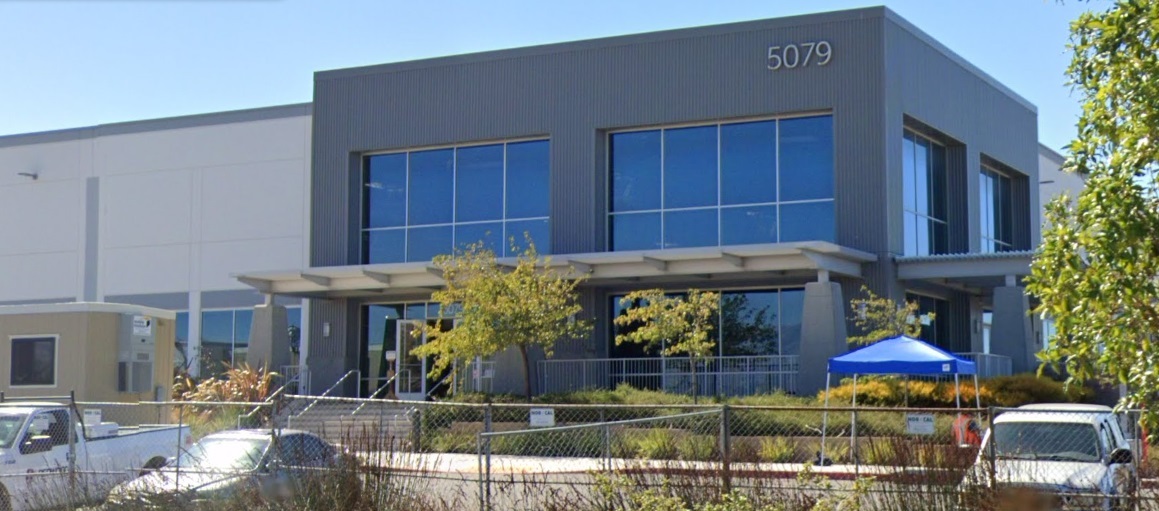SAN JOSE — Google is taking early steps to establish an advanced research hub in San Jose, a move that broadens the tech titan’s presence in the Bay Area’s largest city.
The search giant has filed a proposal for construction work inside and next to a big building in north San Jose’s Alviso district, documents on file with San Jose city planners show.
5079 Disk Drive, an advanced research and industrial building in the Alviso district of north San Jose. (CBRE, Trammel Crow)
Google hopes to accomplish the improvements inside a huge building at 5079 Disk Drive in San Jose, according to a filing by AP+I Design, an architectural firm. AP+I Design is working with Google on the large new project.
In 2018, the 5079 Disk Drive building became one of three huge industrial and advanced tech sites that Google bought through a $117.3 million all-cash purchase.
An advanced research and industrial building at 5079 Disk Drive in north San Jose’s Alviso district, seen in 2018. (George Avalos/Bay Area News Group)
The other two buildings that Google bought in 2018 have addresses of 5087 and 5083 Disk Drive in San Jose.
“The scope of this project includes converting the currently vacant cold shell space into an electronics R&D lab,” AP+I Design stated in a letter the design firm sent to the San Jose Planning Department.
The entire building totals 233,000 square feet. The proposed project is planned for a large chunk of this building, the planning documents show.
The work would upgrade about 87,500 square feet of the building, according to the city records.
Google is expected to employ dozens of people at the advanced research site, states the proposal.
“We’re thrilled to see Google continue to expand their R&D footprint in San Jose,” said San Jose Mayor Matt Mahan.
Here are some of the components of the planned operation, according to the planning documents:
— R&D Testing Rack Lab
— Thermal R&D Lab
— Mechanical R&D Lab
— A small office space to accommodate 44 desks
— A shipping and receiving area
“The space will be designated mainly as lab space,” Google’s design partner, AP+I Design, stated in the planning documents. “We will have a total seated headcount of 65 occupants with limited visitors.”
Mountain View-based Google said it had no information to share regarding the precise nature of the planned operation or which company unit might be located within the building.
In October 2018, the same year as the Disk Drive purchase, Google paid $154.5 million for two curving office buildings located at 4300 North First Street and 4400 North First Street. The two office buildings total a combined 377,000 square feet.
In May 2019, Google paid $137.5 million to buy three office buildings that together total 332,000 square feet and have addresses of 4550 North First Street, 65 Nortech Parkway and 95 Nortech Parkway.
Google’s shopping spree in San Jose’s Alviso district a few years ago enabled the search giant to weave together a cluster of eight office and research buildings, effectively a tech campus that totals 1.27 million square feet.
The tech titan also owns office building clusters on Tasman Drive in north San Jose and leases four office buildings near the corner of North First Street and Brokaw Road. Google occupies multiple buildings at both sites.
In addition to all these locations in San Jose, Google has proposed — but has yet to construct — a mixed-use transit-oriented neighborhood in the city’s urban core that is known as Downtown West. Google is evaluating the precise timeline for the downtown San Jose project.
At the 5079 Disk Drive research and office center in Alviso, Google also appears to be planning to add significant electricity infrastructure to help power the research operation.
The power infrastructure would be located in a utility yard that Google intends to construct next to the 5079 Disk Drive building.
“The new yard will house electrical substations, cooling towers, and chillers,” the Google proposal states.
Google’s activity in Alviso and elsewhere in San Jose is a reminder that local officials must take steps to help companies expand in the Bay Area’s largest city, in the mayor’s view.
“We’re doing our part to increase our housing supply and make the major transit infrastructure upgrades that will allow the world’s leading innovators to grow here,” Mahan said.












